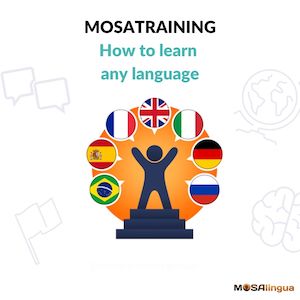
5 Lessons About Mastering a Language from Popular Personal Development Books
Have you ever read a self-help book? Self-help books are written to help readers solve personal problems, improve their lives, and generally become better people. They can help us be more be productive at home or at work (Olivier Roland has a great list of books about productivity and creativity, which includes a one-sentence summary and his personal rating – check it out!), de-stress, think differently about how we spend our time and money, and define our priorities, among other things.
Why are we talking about personal development books on a website dedicated to language learning? Simply because we have found that in many of these books, you can get extremely useful tips and techniques for learning languages more efficiently, even if the book isn’t on the topic of language.
So, here are 5 key lessons we’ve learned from self-help books and how they can help you master any language.
#1: Harness the power of habits
The first lesson comes from The Power of Habit by Charles Duhigg. Duhigg explains that 40% of our daily actions are habits. A habit is an action we perform without any specific intent or willpower. A great example of a habit is brushing our teeth every morning. We do it without having to force ourselves or even thinking about it, since we’ve done it every morning for as long as we can remember. (Thankfully this habit stuck for most people I know!)
What if we could transform our daily language learning sessions into habits? We can, if we understand how habits work.
Leverage the power of habit for language learning
Let’s analyze another very common habit (not such a good one, this time) – checking our phone 200 times a day.
- The habit is triggered by a cue: we hear our phone ring or vibrate
- Which is accompanied by a craving: we want to know who sent us a message or liked our latest Instagram post
- And this combination creates what the author calls a routine: we stop everything to check our phone
- Which ends with a reward: the delight (or at least distraction) of reading a text, email, or social media notification.
Now let’s look at how we can use this knowledge to make studying language into a habit:
- For the cue, you can put a foreign-language book on your desk, or set the web platform included in MosaLingua Premium (Web & Mobile) as your internet browser’s default home page.
- For the craving, you need to set up a reward for completing your task. This can be an immediate one, like eating a piece of chocolate at the end of your study session. If you like chocolate, that is. It can also be a more long-term reward, such as picturing yourself traveling abroad and speaking the language fluently. In this case, the reward isn’t the mental picture you create, but what it represents. In other words, achieving your goal.
- By repeating this routine every day, every time you see the cue (the book or MosaLingua Premium webpage) you’ll start to associate it with the reward. You’ll end up with a craving, which will drive you through the routine to your reward.
And repeating this process for at least 30 days in a row will reinforce the habit. After that, you won’t need much willpower at all to get yourself to study every day.
#2: Rely on social pressure to give your willpower a boost
Speaking of willpower, the next lesson is from a personal development book called The Willpower Instinct by Kelly McGonigal. Sometimes it’s hard to find the willpower, or motivation, to work on difficult projects or goals like learning a language. But willpower is one of the most important ingredients when it comes to language learning. And you need a good dose of it every day to be successful!
Even if we might not want to admit it, we are profoundly influenced by the behavior of the people around us. Behaviors are kind of contagious. As a result, social pressure is brought on by our peers.
How can social pressure help you reach your OWN goals?
Here are my suggestions for using social pressure to your advantage and achieving better results with languages:
- Share your goal of improving your language skills or learning a new language with colleagues, friends, and relatives. You can do this via social media channels or in person. Now your plans are public and you know that if you quit everyone will be aware of your failure. If you do fail, these people won’t judge you or think less of you, but you also won’t want to let them down. This social pressure will push you through and motivate you to work toward your goal every day.
- Pair up with another language learner. Team up with a friend or relative who has a similar goal and agree on specific times to study with them. This will help you both because when one of you is lacking some willpower, the other will be there for support.
- Meet regularly with people who have similar goals. If you don’t know any now, go out and find some! Like I said, behaviors are contagious. So if you regularly meet up with other people who are learning a language, you will end up with more motivation and willpower. That’s how Luca feels when he attends polyglot events. During these gatherings, he meets so many focused and motivated people that he, himself immediately feels more motivated and enthusiastic about learning a language.
How to learn any language

News flash: those people aren’t any smarter than you are, and they don’t have any kind of special gift for language learning, either. It’s all because of the methods they use. Practicing with the latest and most effective techniques, along with a few expert tips, is a recipe for success.
It can work for you, too! MosaTraining combines all of these tips and techniques into one comprehensive, hands-on approach to language learning.
#3: Fend off distractions with “deep work”
The third lesson comes from Cal Newport’s great book Deep Work. Newport defines “deep work” as an activity performed in a state of distraction-free concentration that pushes your cognitive abilities to their limit. These efforts create new value, improve your skills, and are hard to replicate.
The author talks about it in the context of professional activities, but deep work is extremely versatile. And it also happens to be incredibly useful for learning a language. To learn a language you need to practice every day for short but hyper-focused sessions.
How to stay focused during your study sessions
To achieve intense focus during your learning sessions, you need to:
- Avoid multitasking. If you study for 15 minutes, then focus only on the task at hand to maximize productivity. Most of us think we can perform two tasks at once, but most studies show that we aren’t nearly as competent at either when we try.
- Avoid distractions. Put your computer and phone in airplane mode or “do not disturb.” This way, even if you’re tempted to check, you won’t have any notifications waiting for you until after you deactivate this setting at the end of your session.
- Extend your focus over a longer period of time, but don’t overdo it. Channel all of your energy into the task of learning a language for as long as you can, but don’t exhaust yourself. We recommend studying at least 10-15 minutes a day, but don’t try to do too much. Short sessions are more effective because you won’t get bored or overwhelmed. If you really want to study for an hour every day, take a short break every 20 minutes or so, and start again with fresh concentration.
- Block out time during the day to study language. For Luca, morning is the best time to fully focus on language learning and avoid being interrupted. It’s up to you to find what time works best for YOU (right when you wake up, after lunch, or before bed, perhaps). Whenever it is, put a specific time-slot into your agenda so you don’t make other engagements and actually stick to your plan.
#4: From The Miracle Morning, a self-help book by Hal Elrod
We dedicated an entire article to Hal Elrod’s book The Miracle Morning and all of the great lessons it introduces. Want to know more? Check out our article about The Miracle Morning, and get Luca’s tips on how to apply the lessons from this self-help book to language learning. He even shares his own “miracle morning” routine, which is pretty inspiring!
#5: From The Compound Effect, a self-help book by Darren Hardy
We also thought that Darren Hardy’s book was interesting enough for language learners to merit its own article and video. To learn more, read our article about The Compound Effect. In it, Luca explains how to make the best use of the tips from this book. Over time, a little bit goes a long way. Spoiler alert: learning a language is a better investment than money!
5 Lessons You Can Learn about Language by Picking up a Self-Help Book
Luca talks about all of these lessons and books in the video below (or click here to watch it on YouTube). He recorded the video in English, but you can turn on subtitles in one of six different languages by clicking the gear icon in the bottom corner.
Don’t forget to subscribe to our channel for more video tips.


![10 Popular American English Slang Words [VIDEO]](https://www.mosalingua.com/en/files/2017/05/2-300x169.jpg)

Comments